Lights! Camera! But not enough action in a fading, worried Hollywood.
The Washington Post (archive.ph)
By Reis Thebault
2025-06-26 19:08:13GMT
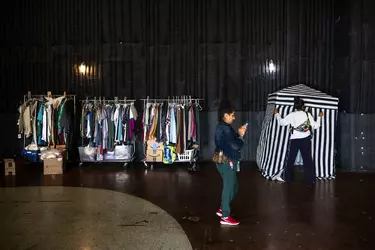
The wardrobe department from a feature film production titled “Patel” at SirReel Studio Services in Los Angeles this month. (Jay L. Clendenin/For The Washington Post)
LOS ANGELES — P.J. Byrne has acted in films and television shows across the country and around the world in the past few years — from New York to New Mexico, Ireland to Australia. But there’s one place he hasn’t worked lately: Hollywood.
Byrne moved to Los Angeles more than 25 years ago, traveling west like so many others to chase a career in the entertainment industry. He’s been among the lucky ones, landing steady pay and critical acclaim for roles in movies like “The Wolf of Wall Street” and “Babylon.”
Yet more and more, his acting jobs are taking him far from Tinseltown. He’s got plenty of company, too, as a trend fretfully dubbed “runaway production” only accelerates. Left behind is a Hollywood in crisis.
“We are an industry town,” Byrne said. “When we are not working, that means California is really hurting.”
Over the past decade, total film and TV production in Los Angeles has plummeted by nearly 40 percent, according to data from the region’s official film office. Both big-name blockbusters and experimental indies have fled to other states and countries, looking for cheaper labor and more attractive tax incentives given studios cutbacks and rising costs.
The economic impact of this exodus extends far beyond actors, writers and directors. Hit hardest are the behind-the-scenes blue-collar workers — the makeup artists and set decorators, the drivers and dry cleaners — who were already struggling to survive in one of the nation’s most expensive metropolises.
Just as dispiriting is the downturn’s psychic toll. Hollywood is California’s most iconic export, as synonymous with the state as sunshine. It made Los Angeles a worldwide hub for artists and dreamers. But America’s fantasy factory is offshoring. Evidence is found in empty soundstages, prop houses selling off their stock, dwindling job opportunities.
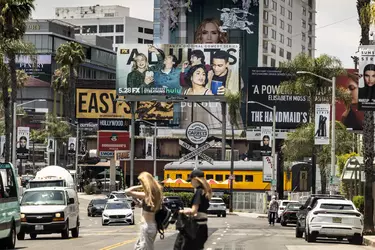
Billboards advertise TV shows along Sunset Boulevard in West Hollywood. (Jay L. Clendenin/For The Washington Post)
“The industry is on a cliff edge, clinging by its fingernails,” said George Huang, a screenwriter, director and film professor at UCLA. “It feels like one more blow, even just a tiny feather on our shoulder, is going to send us careening down to our rocky deaths.”
Hollywood has weathered upheaval before, starting with the emergence of “talkies” in the late 1920s. And other locales, whether they be Vancouver’s “Hollywood North” or Atlanta’s “Y’allywood,” have for decades been luring productions away.
Still, this moment feels more precarious than ever. The pandemic shutdown, a pair of protracted labor strikes and January’s catastrophic wildfires all battered an industry already experiencing extreme disruption — falling box office revenue, empty theaters — in the streaming era.
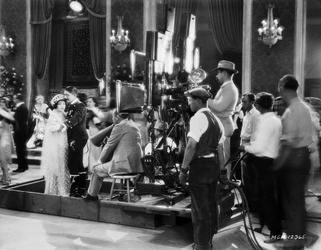
A director and crew film a ballroom scene for a 1927 film starring Hollywood actress Renée Adorée. (John Kobal Foundation/Getty Images)
The dire situation has attracted bipartisan attention, with California Gov. Gavin Newsom and President Donald Trump, despite their deepening hostilities, in rare agreement that something must be done. “Hollywood is being destroyed,” the president declared last month.
And the push to reverse the slump has united a diverse range of industry insiders and dependents. Byrne is one of many advocating for an overhaul of the state’s tax credit program, which now lags far behind competitors.
“We’re not competing on an even playing field,” noted Byrne, who studied finance as well as theater in college. “We’re fighting over scraps at the table.”
The Los Angeles fires were a wake-up call, he said. His family evacuated their home, and he felt powerless to help. He was filming at the time — in Dublin.
How different things were when the first filmmakers from out east came to Los Angeles in the early 1900s. The prime attraction then: weather. They fled disruptive winters and found a place where they could shoot Westerns outside year-round.
A rush of studios soon set up shop, many of them in the sleepy teetotaling suburb known as Hollywood. City and industry grew up together, massive movie company lots sprawling just as Los Angeles swelled. Eventually, all but one major studio, Paramount Pictures, relocated to other parts of the region.
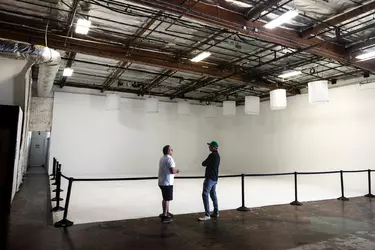
Wes Bailey, founder and CEO of SirReel Studio Services, speaks with location manager John Rizzi, left, at SirReel’s production studios. (Jay L. Clendenin/For The Washington Post)
But the name and symbolism of Hollywood, of dazzling stars on the silver screen, endured. Look no further than the famous sign — a towering, nine-letter advertisement for the industry — that has loomed over the city for a century. Look no further than the Walk of Fame, the Academy Awards and all the celebrations that still mark Los Angeles as the capital of the entertainment world.
“I don’t care what country you’re from or what language you speak, there’s one word that everybody understands, and that’s ‘Hollywood,’” said Donelle Dadigan, founder of the Hollywood Museum, an archive showcasing more than a hundred years of history.
For many, Los Angeles was long a default filming location, home to the most experienced crews and a vast industry infrastructure.
“When I started, I was only shooting in L.A.,” said Ram Bergman, a producer whose credits include “Knives Out” and “Star Wars: The Last Jedi.”
Around the time Bergman arrived here in 1991, though, lawmakers elsewhere were rolling out plans to woo productions. By the early 2000s, the competition was in full swing, with states and countries trying to one-up each other.
For producers on tight budgets, California began making less financial sense.
“The studios, the streamers, the networks, they have less money to spend, but they still need shows, they still need movies, so how do you maximize the money?” said Bergman, who hasn’t filmed in Los Angeles for more than a decade. “It’s not even crossed my mind to film in L.A.”
Film tax credits, which production companies can sell or use to offset their tax liability, have a mixed track record, and some researchers have criticized them as a poor use of taxpayer money. They remain popular among legislatures, however, and have proved effective at pulling productions away from Los Angeles.

Bailey, standing on a morgue set at his production studios, is part of a campaign to help reinvigorate the entertainment industry in Hollywood. (Jay L. Clendenin/For The Washington Post)
Other states are stepping up their pursuits. In the past two months, lawmakers in New York and Texas earmarked hundreds of millions of additional dollars for their tax credit programs. Other countries, where labor costs are often lower, are doing the same, enticing a growing number of productions overseas.
Bill Mechanic, a former top executive at Paramount, Disney and Fox, is preparing to produce a film noir set in Los Angeles. He wants to shoot it locally — the genre has a rich history in L. A.— but he fears high costs may force him to go to Australia.
“You have a choice,” he said. “Do you want to make the movie, or do you not want to make the movie?”
Mechanic, a Michigan native, watched the decline of auto manufacturing in Detroit. He sees echoes in Los Angeles today.
California has its own tax credit program, but demand far exceeds the funding available. Newsom and state lawmakers are poised to raise that to $750 million annually, more than double the current level. Separately, the legislature is considering bills that would increase the tax credit’s base rate and allow more types of productions to be eligible for the program.
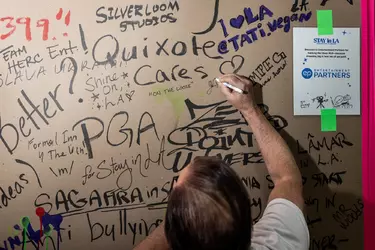
Rizzi signs a wall of support for the #StayinLA campaign. (Jay L. Clendenin/For The Washington Post)
Some officials have criticized the proposals as Hollywood handouts, which come as the state tries to close a daunting budget deficit. Supporters argue the film industry is a boon for all of California, not just Los Angeles.
“We must meet this moment,” said Colleen Bell, a former TV producer and the executive director of the California Film Commission, a state agency. “If California lost the entertainment industry, we’d lose more than jobs. We’d lose a big part of who we are.”
In response to the ever more frantic calls from Hollywood, Newsom appealed last month to the White House for a federal tax credit that would help the United States remain competitive with other countries.
Trump has floated a very different solution: 100 percent tariffs on movies made overseas. The proposal blindsided many, who said it could send Hollywood into a death spiral. A White House spokesperson appeared to walk the idea back one day later, saying “no final decisions” had been made, and by this month the president was instead threatening the state with massive funding cuts and sending in National Guard troops and the Marines as protests erupted here over federal immigration detentions.

Nancy Haigh, a set decorator with Oscars for her work on “Bugsy” and “Once Upon a Time in Hollywood,” says California must overhaul its tax incentive program to entice movie productions back to the state. (Jay L. Clendenin/For The Washington Post)
These days, the mood in Los Angeles is sour.
“I’m not hopeful anymore, unfortunately,” said Nancy Haigh, who at 78 is one of the industry’s most decorated set decorators.
Haigh is a nine-time Oscar nominee and two-time winner. Her credits include “Once Upon a Time in Hollywood” and “Forrest Gump.” She’s never gone so long without being approached with work.
“I’ve never not had my phone ring,” she said. “I’ve been very fortunate. I’ve had a wonderful career. But my phone hasn’t rung in a year.”
Contrary to Hollywood’s glamorous reputation, most in the business are middle class at best. The sustained downturn has pushed many workers into increasingly desperate situations. With savings depleted during the pandemic and strike slowdowns, they’ve turned to part-time jobs at restaurants and retailers. Some are living paycheck to paycheck. Some have lost health insurance. Some have moved away.
“A good portion of our membership has been chronically unemployed,” said Malakhi Simmons, the vice president of the International Alliance of Theatrical Stage Employees Local 728, the union that represents lighting technicians.
January’s blazes, which tore through the communities of Pacific Palisades and Altadena, made matters worse. More than 1,000 entertainment union members lost their homes, Simmons said.
The devastation felt especially cruel given the many hopes that this would be a turnaround year. “Stay alive until ’25” had been a mantra in Hollywood; instead, barely one week in, the industry was dealt yet another blow as flames consumed entire neighborhoods.
“From a morale standpoint, it was just devastating,” Pamala Buzick Kim, a small-business owner and former talent representative who co-founded the #StayinLA campaign this spring.
In the aftermath, thousands signed the campaign’s petition calling on lawmakers to revamp the state tax incentive program and on studios to commit to increased production in Los Angeles over the next three years. Doing so, they argued, would be a crucial part of disaster recovery.
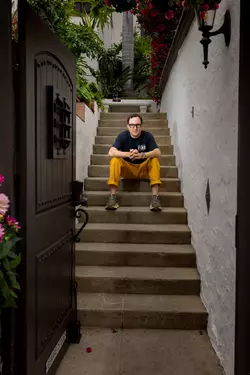
“We are an industry town,” says actor P.J. Byrne, a longtime Angeleno who last year had a featured role in the Bob Dylan biopic “A Complete Unknown.” (Jay L. Clendenin/For The Washington Post)
Byrne believes that bringing back productions would help offset the economic turmoil triggered by the wildfires. Rebuilding Los Angeles should extend to rebuilding the entertainment industry, the actor said. “This is the way to help heal our city.”
He wants to film in his adopted home, and he wants officials to make the process more affordable and less complex. In between jobs, he has appeared at rallies to promote changes to the tax credit program.
But he recently was back on set. In Toronto.
The Washington Post (archive.ph)
By Reis Thebault
2025-06-26 19:08:13GMT

The wardrobe department from a feature film production titled “Patel” at SirReel Studio Services in Los Angeles this month. (Jay L. Clendenin/For The Washington Post)
LOS ANGELES — P.J. Byrne has acted in films and television shows across the country and around the world in the past few years — from New York to New Mexico, Ireland to Australia. But there’s one place he hasn’t worked lately: Hollywood.
Byrne moved to Los Angeles more than 25 years ago, traveling west like so many others to chase a career in the entertainment industry. He’s been among the lucky ones, landing steady pay and critical acclaim for roles in movies like “The Wolf of Wall Street” and “Babylon.”
Yet more and more, his acting jobs are taking him far from Tinseltown. He’s got plenty of company, too, as a trend fretfully dubbed “runaway production” only accelerates. Left behind is a Hollywood in crisis.
“We are an industry town,” Byrne said. “When we are not working, that means California is really hurting.”
Over the past decade, total film and TV production in Los Angeles has plummeted by nearly 40 percent, according to data from the region’s official film office. Both big-name blockbusters and experimental indies have fled to other states and countries, looking for cheaper labor and more attractive tax incentives given studios cutbacks and rising costs.
The economic impact of this exodus extends far beyond actors, writers and directors. Hit hardest are the behind-the-scenes blue-collar workers — the makeup artists and set decorators, the drivers and dry cleaners — who were already struggling to survive in one of the nation’s most expensive metropolises.
Just as dispiriting is the downturn’s psychic toll. Hollywood is California’s most iconic export, as synonymous with the state as sunshine. It made Los Angeles a worldwide hub for artists and dreamers. But America’s fantasy factory is offshoring. Evidence is found in empty soundstages, prop houses selling off their stock, dwindling job opportunities.

Billboards advertise TV shows along Sunset Boulevard in West Hollywood. (Jay L. Clendenin/For The Washington Post)
“The industry is on a cliff edge, clinging by its fingernails,” said George Huang, a screenwriter, director and film professor at UCLA. “It feels like one more blow, even just a tiny feather on our shoulder, is going to send us careening down to our rocky deaths.”
Hollywood has weathered upheaval before, starting with the emergence of “talkies” in the late 1920s. And other locales, whether they be Vancouver’s “Hollywood North” or Atlanta’s “Y’allywood,” have for decades been luring productions away.
Still, this moment feels more precarious than ever. The pandemic shutdown, a pair of protracted labor strikes and January’s catastrophic wildfires all battered an industry already experiencing extreme disruption — falling box office revenue, empty theaters — in the streaming era.

A director and crew film a ballroom scene for a 1927 film starring Hollywood actress Renée Adorée. (John Kobal Foundation/Getty Images)
The dire situation has attracted bipartisan attention, with California Gov. Gavin Newsom and President Donald Trump, despite their deepening hostilities, in rare agreement that something must be done. “Hollywood is being destroyed,” the president declared last month.
And the push to reverse the slump has united a diverse range of industry insiders and dependents. Byrne is one of many advocating for an overhaul of the state’s tax credit program, which now lags far behind competitors.
“We’re not competing on an even playing field,” noted Byrne, who studied finance as well as theater in college. “We’re fighting over scraps at the table.”
The Los Angeles fires were a wake-up call, he said. His family evacuated their home, and he felt powerless to help. He was filming at the time — in Dublin.
How different things were when the first filmmakers from out east came to Los Angeles in the early 1900s. The prime attraction then: weather. They fled disruptive winters and found a place where they could shoot Westerns outside year-round.
A rush of studios soon set up shop, many of them in the sleepy teetotaling suburb known as Hollywood. City and industry grew up together, massive movie company lots sprawling just as Los Angeles swelled. Eventually, all but one major studio, Paramount Pictures, relocated to other parts of the region.

Wes Bailey, founder and CEO of SirReel Studio Services, speaks with location manager John Rizzi, left, at SirReel’s production studios. (Jay L. Clendenin/For The Washington Post)
But the name and symbolism of Hollywood, of dazzling stars on the silver screen, endured. Look no further than the famous sign — a towering, nine-letter advertisement for the industry — that has loomed over the city for a century. Look no further than the Walk of Fame, the Academy Awards and all the celebrations that still mark Los Angeles as the capital of the entertainment world.
“I don’t care what country you’re from or what language you speak, there’s one word that everybody understands, and that’s ‘Hollywood,’” said Donelle Dadigan, founder of the Hollywood Museum, an archive showcasing more than a hundred years of history.
For many, Los Angeles was long a default filming location, home to the most experienced crews and a vast industry infrastructure.
“When I started, I was only shooting in L.A.,” said Ram Bergman, a producer whose credits include “Knives Out” and “Star Wars: The Last Jedi.”
Around the time Bergman arrived here in 1991, though, lawmakers elsewhere were rolling out plans to woo productions. By the early 2000s, the competition was in full swing, with states and countries trying to one-up each other.
For producers on tight budgets, California began making less financial sense.
“The studios, the streamers, the networks, they have less money to spend, but they still need shows, they still need movies, so how do you maximize the money?” said Bergman, who hasn’t filmed in Los Angeles for more than a decade. “It’s not even crossed my mind to film in L.A.”
Film tax credits, which production companies can sell or use to offset their tax liability, have a mixed track record, and some researchers have criticized them as a poor use of taxpayer money. They remain popular among legislatures, however, and have proved effective at pulling productions away from Los Angeles.

Bailey, standing on a morgue set at his production studios, is part of a campaign to help reinvigorate the entertainment industry in Hollywood. (Jay L. Clendenin/For The Washington Post)
Other states are stepping up their pursuits. In the past two months, lawmakers in New York and Texas earmarked hundreds of millions of additional dollars for their tax credit programs. Other countries, where labor costs are often lower, are doing the same, enticing a growing number of productions overseas.
Bill Mechanic, a former top executive at Paramount, Disney and Fox, is preparing to produce a film noir set in Los Angeles. He wants to shoot it locally — the genre has a rich history in L. A.— but he fears high costs may force him to go to Australia.
“You have a choice,” he said. “Do you want to make the movie, or do you not want to make the movie?”
Mechanic, a Michigan native, watched the decline of auto manufacturing in Detroit. He sees echoes in Los Angeles today.
California has its own tax credit program, but demand far exceeds the funding available. Newsom and state lawmakers are poised to raise that to $750 million annually, more than double the current level. Separately, the legislature is considering bills that would increase the tax credit’s base rate and allow more types of productions to be eligible for the program.

Rizzi signs a wall of support for the #StayinLA campaign. (Jay L. Clendenin/For The Washington Post)
Some officials have criticized the proposals as Hollywood handouts, which come as the state tries to close a daunting budget deficit. Supporters argue the film industry is a boon for all of California, not just Los Angeles.
“We must meet this moment,” said Colleen Bell, a former TV producer and the executive director of the California Film Commission, a state agency. “If California lost the entertainment industry, we’d lose more than jobs. We’d lose a big part of who we are.”
In response to the ever more frantic calls from Hollywood, Newsom appealed last month to the White House for a federal tax credit that would help the United States remain competitive with other countries.
Trump has floated a very different solution: 100 percent tariffs on movies made overseas. The proposal blindsided many, who said it could send Hollywood into a death spiral. A White House spokesperson appeared to walk the idea back one day later, saying “no final decisions” had been made, and by this month the president was instead threatening the state with massive funding cuts and sending in National Guard troops and the Marines as protests erupted here over federal immigration detentions.

Nancy Haigh, a set decorator with Oscars for her work on “Bugsy” and “Once Upon a Time in Hollywood,” says California must overhaul its tax incentive program to entice movie productions back to the state. (Jay L. Clendenin/For The Washington Post)
These days, the mood in Los Angeles is sour.
“I’m not hopeful anymore, unfortunately,” said Nancy Haigh, who at 78 is one of the industry’s most decorated set decorators.
Haigh is a nine-time Oscar nominee and two-time winner. Her credits include “Once Upon a Time in Hollywood” and “Forrest Gump.” She’s never gone so long without being approached with work.
“I’ve never not had my phone ring,” she said. “I’ve been very fortunate. I’ve had a wonderful career. But my phone hasn’t rung in a year.”
Contrary to Hollywood’s glamorous reputation, most in the business are middle class at best. The sustained downturn has pushed many workers into increasingly desperate situations. With savings depleted during the pandemic and strike slowdowns, they’ve turned to part-time jobs at restaurants and retailers. Some are living paycheck to paycheck. Some have lost health insurance. Some have moved away.
“A good portion of our membership has been chronically unemployed,” said Malakhi Simmons, the vice president of the International Alliance of Theatrical Stage Employees Local 728, the union that represents lighting technicians.
January’s blazes, which tore through the communities of Pacific Palisades and Altadena, made matters worse. More than 1,000 entertainment union members lost their homes, Simmons said.
The devastation felt especially cruel given the many hopes that this would be a turnaround year. “Stay alive until ’25” had been a mantra in Hollywood; instead, barely one week in, the industry was dealt yet another blow as flames consumed entire neighborhoods.
“From a morale standpoint, it was just devastating,” Pamala Buzick Kim, a small-business owner and former talent representative who co-founded the #StayinLA campaign this spring.
In the aftermath, thousands signed the campaign’s petition calling on lawmakers to revamp the state tax incentive program and on studios to commit to increased production in Los Angeles over the next three years. Doing so, they argued, would be a crucial part of disaster recovery.

“We are an industry town,” says actor P.J. Byrne, a longtime Angeleno who last year had a featured role in the Bob Dylan biopic “A Complete Unknown.” (Jay L. Clendenin/For The Washington Post)
Byrne believes that bringing back productions would help offset the economic turmoil triggered by the wildfires. Rebuilding Los Angeles should extend to rebuilding the entertainment industry, the actor said. “This is the way to help heal our city.”
He wants to film in his adopted home, and he wants officials to make the process more affordable and less complex. In between jobs, he has appeared at rallies to promote changes to the tax credit program.
But he recently was back on set. In Toronto.


